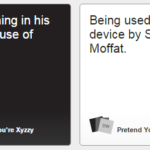Am I rewatching the new Doctor Who ep for the third time today? PERHAPS.
But one of the things that stands out to me so much about this episode is that it washes away a lot of the things that made me frustrated about the Moffat era.
- The plot MAKES SENSE. I feel like I could use this ep to introduce anyone to Doctor Who and it would make sense. It’s not concerned with being THE MOST “CLEVER” THING ON TV. It’s not concerned with twists and turns and surprises that aren’t earned just to prove how clever the writers are.
- It’s fun. It’s legitimately fun.
- The new companions? There doesn’t seem to be a big mystery about them (*cough*Clara*cough*River*cough*) They seem like normal people who were just in the right/wrong place at the right/wrong time. GIVE ME MORE OF ANYONE CAN BE HEROIC INSTEAD OF ONLY THE *SPECIAL* TRAVEL WITH THE DOCTOR. Let me see myself in them cause I’m not special, but I bet I could be if I got to travel with her.
- Showing that the Doctor is brilliant and clever and quick instead of just telling and telling and telling me.
- All the companions get to use their knowledge to help the Doctor. And it’s not magic knowledge, it’s things like bus drivers and police work and social media.
- The Doctor never pulls a ‘no I have to go alone’ bullshit – everyone’s like ‘how do we help?’ and she’s all ‘C’MON FAM WE’RE GOING TO FIX THIS TOGETHER’.
I just really like this season already, okay?
i really resonate with your comment about the companions being normal, everyday people put into extraordinary situations that challenge them and test them as opposed to mystery boxes or Incredibly Special People
there was this interaction that twelve had with bill that really rubbed me up the wrong way which was this:
DOCTOR: Humanity’s doomed to never learn from its mistakes.
BILL: Well, I guess that’s part of our charm.
DOCTOR: No, it’s really quite annoying. […]
BILL: Why do you put up with us, then?
DOCTOR: In amongst seven billion, there’s someone like you. That’s why I put up with the rest of them.sure, some people are assholes, but even then, one in 7 billion? it just seems so antithetical to dw’s core message. everyone’s got something to offer, or some capacity for change. i’m glad The Chibs ™ is going back to basics in terms of how rtd would really focus in on how each person had something of value about them and sense of complexity, even if they were the smallest background character
Me And My Male Showrunners
Today, on the way to work, I said to myself: “I’m 46. It’s 2016. I have a job, a wife, a daughter…why am I still yelling at Chris Carter?”
You spend a lot of time yelling at male showrunners, I said to myself. All of it wasted. Does Steven Moffat care what you think about what he did to Doctor Who? Or about the end of Season 3 of Sherlock? Poor Gene Roddenberry is dead now, and you couldn’t rewatch Star Trek TOS without yelling at him, poor man. And back in the day, how you used to yell at Piller and Berman and Brannon Braga about Next Generation and Deep Space Nine! It’s a good thing you don’t care enough about the J. J. Abrams Star Trek movies to waste time yelling at him too.
What is it that these showrunners all have in common? You know, apart from being men? Are there ANY male showrunners you’re not yelling at?
I thought, well, there’s John Finnemore.
You all might not know who John Finnemore is. He ran/wrote/starred in a radio sitcom called “Cabin Pressure” whose cast included Benedict Cumberbatch. I love “Cabin Pressure.” This does not mean that I am never critical of it. Ask me sometime about the whole “Martin doesn’t get paid” thing. BUT, even when I am disappointed with something about it, “Cabin Pressure” doesn’t make me angry the way I get when things go south in, say, The X-Files. Why not?
Considering this question, I have arrived at these points:
1) Finnemore put a lot of effort into plotting. Of course you have to do this with a sitcom; take the plot out and you just have a random collection of one-liners and sight gags. But at its best, “Cabin Pressure” is very well-constructed and if you look at what he’s said about the writing process it’s clear that a lot of thought goes into that.
OK, so I’m a plot geek and not everyone is about that. I get it. But then there’s
2) Finnemore put the show ahead of his own ego. He played one of the characters, and I’m not saying he never did himself a solid by writing something special for Arthur; but it’s always an ensemble show, and the final product always matters more than anything any one character gets to do–including the one Finnemore was playing.
Maybe that’s what really makes me angry–when I see the Big Cheese screwing everything up for the company and the creative team by insisting on something that serves his own ego but makes no sense for anyone else who’s invested in the show. Cause I see that happen a lot in my real life and I KNOW how pissed off I get about that.
Then I thought, you know what, Russell T. Davies might be an interesting borderline example here. I became a fan of Doctor Who during his era, and kind of became a fan of Torchwood even though, oh my God, the problems with Torchwood you could write a fucking book about. Why was I tolerant of Davies and his mistakes–even when the individual mistakes made me extremely angry–in a way that I was not tolerant of Moffat? And so I formulated postulate 3:
3) I can put up with a lot of crap as long as the characters and their relationships work.
And I guess this is why I end up yelling so much at the other guys. Back when I was trying to figure out how to write science fiction short stories, and reading the models, I did notice that most of the ones that made it into the big magazines were about 90% premise and 10% characterization. This mix does not work for me. I like speculative fiction but I also need characters whose emotions feel real to me and whose relationships are treated as if they are important. When the show’s emotional plot is broken, that’s when I get pissed off.
For instance, I really hated the end of Doctor Who’s fourth season because of the way it got rid of one of my favorite characters. Much yelling at RTD over that. BUT, I will say that what RTD did to Donna Noble in that episode, he did BECAUSE he understood her relationship to the Doctor and why it mattered and why we cared about her as a character. Same thing for the way he ended “Children of Earth.” I mean that was awful. But it was not awful in a way that made no emotional sense. It was awful because actually it did. I mean RTD was not nice to the viewers; he was not nice to his characters. But I believe that he knew them better than we did and that they felt at least as real to him as they did to us.
I don’t believe that about Carter, when it comes to Mulder and Scully; and I guess I’ve never believed it about Moffat either. So maybe that’s the source of it. I don’t know. I have work to do.
Reblogging this because YES. YES YES YES.
1000000% agree about John Finnemore, and he is the example I bring up every single time when I want to point to a writer who constructed beautiful character arcs and actually pulled them off. The characters developed as people, everything made so much sense emotionally. The characters felt REAL because Finnemore treated them like they were.
(My poor husband, he’s the one who usually has to listen to me rant about John Finnemore. I mean, he totally agrees with me. But I can’t stop.)
And here, right here, is the difference between John Finnemore and Chris Carter and Moffat and Gatiss. Does the writer treat the characters as if they are real, or do they start treating them like a way to have fun?
There’s a big difference.
For Your Consideration: Michael Schur (Parks and Recreation, Brooklyn Nine-Nine, The Good Place)
Yeah, this is an old post and I hadn’t started The Good Place or Brooklyn Nine-Nine yet when I wrote it. But usually I do not want to yell at Mike Schur.
every time i fuck up plugging in the USB to charge my iphone and scratch it against the underside of the phone i think about that scene at the start of sherlock where sherlock assumes that john watson’s sister is an alcoholic because of the scratches around the charging port of the iphone she gave to him as a gift and i think to myself “man sherlock is a fucking idiot”
#god if I could meet Sherlock holmes I would have a field day preparing my Look to throw him off #watch
me wear an engagement ring for a week before hand and take it off and
wear one of my mom’s blouses that has the shoulder all crunched #from years of violin playing and a pair of brand new matching socks and carry a brand new copy of a book i’ve read 20 times #and spill some coffee on my shoes and cuddle my neighbor’s cats so i have different cat fur on me #my dream is to throw off a sherlock holmes type with pure petty bsActually the thing about scratches around charger port=alcoholic was a reference to the original stories, where the phone was obviously instead a pocket watch, and the charger port was the spring wind, which was harder to fuck up than plugging in a phone. The whole sherlock scan thing worked well in the victorian era, because social roles were just that rigid – the slightest deviation from the norm said everything.
That obviously doesn’t fucking work now, and the only reason that was a thing in Sherlock is because Moffat is a pretentious asshole who thinks that a show being well written, sensible, and having a coherent plot structure is all for lesser writers, and the only thing he needs is to seem as clever as possible. Which admittedly, does work out for him for a few years, until the plot holes build up too much, and fans start to get pissed off about nothing ever being resolved but instead being thrown away for the new bigger mystery it led to, which then gets thrown away for the new bigger mystery that led to. Remember Doctor Who, how at the start of Moffat’s time as showrunner, he opened series 5 with ‘what caused the crack in Amy’s wall’? He never fucking answered that. He got distracted and wandered off into different plot threads that also never got resolved. He’s a very good writer when given a single episode to work with! His first episode on Doctor Who, he was just a guest writer, and he did the first Weeping Angels episode, and it was really good, because he only had that hour to tell the story. There was no follow up episode, no next season, just this amount of time, start a story, wrap it up satisfyingly, the end. He should NEVER have been put in charge of a show, because he’s the sort of writer that really needs something to reign him in and keep him on track, to remind him ‘hey you didn’t finish that plot, wrap it up before switching tracks’.
So it looks like he’s building this giant complex mystery, and keeps promising a satisfying answer to EVERYTHING once it’s over, but it’s never over because he doesn’t know how to let shit go – there’s always got to be another twist. The Weeping Angels can’t just zap you back in time and call it a day, they need to be made an EVEN BIGGER THREAT, they gotta be able to possess you! And steal the voices of dead people! and move while you’re looking! and be the statue of liberty! and instead of leaving you alone after the time warp, they hold you prisoner for the rest of your life now! No need to explain how or why, just escalate! And of course, Sherlock can’t just fake his death, take down moriarty’s organization, and then return to solving weird crimes, nope, there has to be a bigger threat than goddamn moriarty! he needs to have a secret evil sister! and secret dead childhood friend whose represented as a dog in his memories! and maybe moriarty isnt really dead – no wait, he is – no wait, he ISN’T – no wait, he is – OR IS HE? and john can’t just get married to a nice girl he loves, NOPE, gotta be more drama, she’s secretly an assassin and on the run from the government.
Moffat just keeps building and building and building, but eventually his stories start to collapse under their own weight because he’ll never let there be an end – he just can’t let go. And eventually fans will start to get bored and annoyed with the twists, and the show that used to make them feel smart will now just make them feel irritated. And they know there will never be a conclusion to the story, so they lose interest in the characters, because there’s no struggle – its never going to wrap up, so who cares? So they stop watching, and moffat starts dropping in viewers and ratings, and tries more desperate twists to bring people back, driving away the ones still holding on… lather rinse repeat until the network finally pulls the plug and makes him walk away.
basically the sherlock scan thing made sense in the original context, in a modern setting it’s just bad writing fam
I don’t even watch Sherlock but this was wonderful to read
Someone explained very well how I feel about Stephen Moffat. I’m still pissed years later that he ruined the weeping angels for me by showing them move.
Everything about why I hate what Steven Moffat did to Doctor Who in one post. Thank you. Bless you.
“And I’m looking for a blonde in a Union Jack. A specific one, mind you, I didn’t just wake up this morning with a craving.” – Ninth Doctor
“I’m looking for a friend. A very specific friend, I’m not just browsing.” – John Watson
I SEE YOU RECYCLING LINES, MOFFAT ;D
Nice pickup! Never realized that before.
This is what happens when I rewatch both Doctor Who and Sherlock on a constant loop. Pretty soon, I’ll have them all committed to memory.
I’ve got a post somewhere in my Moffat wank tag of recycled lines. It’s kinda annoying.
steven moffat: there’s no vacancy in doctor who, peter’s going to be around for a while.
fans: sweetie 🙂
#THAT’S NOT THE VACANCY WE’RE INTERESTED IN
Moffat: as for writing the scripts, that usually happens the moment someone sends me an email saying ‘you realise that script was due 3 weeks ago’
This explains so much





